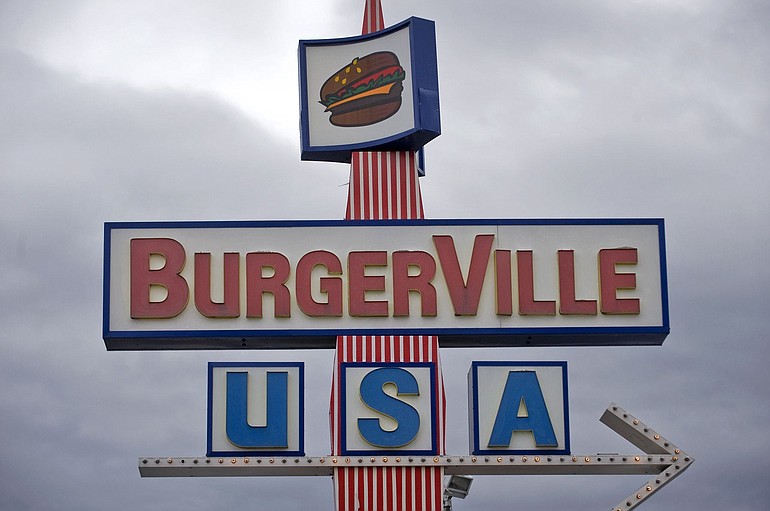A time-worn hamburger stand that helped launch one of Vancouver’s most iconic home-grown businesses will be gone by the end of October.
Downtown’s Burgerville USA on East Mill Plain Boulevard has been sold to an apartment developer who plans to demolish what was the company’s second location when it opened in 1962. And as Burgerville celebrates its 50th anniversary this year, its leaders say they will continue seeking a new site in the downtown core, but they are ready to let go of the cinder-block restaurant with its walk-up windows, red-white-and-blue sign, and roof line of American flags.
The site’s 17 employees will be transferred to other locations within the 39-restaurant chain.
Just west of the Interstate 5 exit, the Mill Plain venue’s look hasn’t changed much after years serving generations of freeway travelers and workers from downtown offices and port-area industries.
It has also served as a hangout for throngs of Gut-cruising teenagers and as a special treat for kids, said Suzie Wilson, a resident of the nearby Arnada neighborhood. Wilson, who has lived in her downtown home since 1988, has often walked to the Mill Plain Burgerville, pulling her three youngsters along in a Radio Flyer wagon.
“It’s sad. It’s just an institution in the neighborhood,” Wilson said.
Although some are sad, others say the end of Burgerville’s oldest remaining location will breed new opportunities for downtown revitalization.
It also could launch the evolution of Burgerville’s next 50 years. The fast-food restaurant was founded by the late George Propstra whose father, Dutch immigrant Jacob Propstra, started Vancouver’s Holland Creamery in 1928. That venue, at the corner of 18th and Main streets, evolved into a popular downtown restaurant that closed in 2001.
George Propstra was a major philanthropist during his life, paying to redevelop Esther Short Park, giving recreational facilities to the community, and setting up funds that still support local schools today.
“They’ve been a long-standing and valuable institution in our community and our hope is they will continue to be that, and maybe look for another location downtown,” Vancouver Mayor Tim Leavitt said of Burgerville and its owners.
The search for a new downtown Vancouver restaurant site is complicated by several big changes expected in the coming years, said Jack Graves, Burgerville’s chief cultural officer.
“With the possibility of a new Columbia River crossing and light rail,” knowing what the city will look like is hard to predict, he said.
Elie Kassab, president and owner of Prestige Development, purchased the Mill Plain Burgerville site for $750,000.
It is the final piece of a full city block his company plans to turn into a $16 million apartment complex called Prestige Plaza. Kassab purchased the southern part of the block, facing East 13th Street and bordered by C and D streets, in 2007 and demolished the old Vancouver Police Station that once rested on the site.
Now, he plans to develop the block into two four-story buildings with ground-floor commercial space to accommodate small businesses, such as a deli and grocer. The upper levels will house 100 apartments in studio, one- and two-bedroom units.
“This contributes tremendously to the revitalization of downtown and making it a 24-hour city,” said Kassab, who also developed downtown’s City Center 12 theater and the 46-unit Lewis & Clark Plaza apartments at Sixth and Broadway streets.
The block Burgerville sits on is directly south of downtown’s newest building, the Al Angelo Co.’s five-story structure, which opened in 2009 to replace a crumbling and vacant Denny’s restaurant.
Graves said the nostalgic value of the chain’s oldest venue isn’t lost on company officials.
“People are going to say, ‘That’s my old hangout; it’s where I met my sweetheart,” he said. “All of us are grappling with the challenge of getting our hearts and heads around this decision. It’s not an easy one.”
He said he sees no point in turning the restaurant into a historical site, like Portland’s retro McDonald’s off Southeast Powell Boulevard.
“A company our size can’t afford to have operations that aren’t really contributing to the whole,” said Graves, who has spent the last 35 years working for The Holland Co., the privately owned company that operates the Burgerville.
Birth of the drive-through
Graves said the downtown Burgerville was obsolete shortly after it opened in 1962 because it was always without a drive-through window, a design the company had incorporated into nearly every location by the early 1970s.
“It (drive-up ordering) still accounts for close to 60 percent of all of our business. If you look at that, you can understand how much business we lose downtown,” he said.
Although Graves would not disclose company sales figures, he said business improved in 2010 over 2009.
“We’ve actually increased our market share,” he said.



